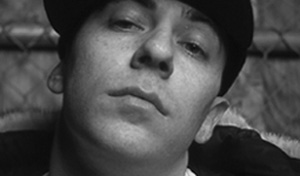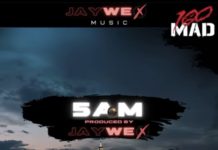By Noah Sanders
Two, maybe three years ago, I would’ve listened to Doujah Raze’s Past, Presence, Features once, and retired it to a corner with all of the other New York styled boom-bap that was inundating the market. At the time there was just too much hip-hop that recalled this classic sample heavy New York sound, and it would’ve just been a splash in the ocean. Now, after two years of prog/art-rap reestablishing what the world defines as hip-hop, Past, Presences, Features is a refreshing change of pace. Doujah Raze fashions an album that will pull your head out of the foggy realm of sonic soundscapes and electronic noise and immerse you back into sped up vocal loops, banging drums, and grimy rhymes of days past.Doujah Raze, sounding like a younger, hungrier DMX, sketching portraits of the street with his sandpapery voice while still maintaining his hardened edge. Tracks like “”Fahrenheit,” with its horn stabs and growling bass line, and “The Dedication,” with a beat ripped out of your favorite 70’s cop show, Raze shows off his hard-as-nails steez. Both songs give Doujah Raze able opportunity to rip a series of heated, rough verses backed by some of New York’s finest. Sean Price in particular, on both “Fahrenheit” and the Kev Brown-produced “Loose Cannons,” shows off why he used to be one of the hottest emcees in the game.The album’s only real problem is a handful of tracks that just don’t step out far enough to really distinguish themselves. Both “The Light Now” and “Give It Up” are decent tracks, but are easily lost amongst the stronger songs that sound remarkably similar. These songs fade from memory even more so when coupled with tracks like the Shuko-produced “Hurricanes,” an introspective journey into Doujah Raze’s darker days, backed by an infectious flute loop.
retired it to a corner with all of the other New York styled boom-bap that was inundating the market. At the time there was just too much hip-hop that recalled this classic sample heavy New York sound, and it would’ve just been a splash in the ocean. Now, after two years of prog/art-rap reestablishing what the world defines as hip-hop, Past, Presences, Features is a refreshing change of pace. Doujah Raze fashions an album that will pull your head out of the foggy realm of sonic soundscapes and electronic noise and immerse you back into sped up vocal loops, banging drums, and grimy rhymes of days past.Doujah Raze, sounding like a younger, hungrier DMX, sketching portraits of the street with his sandpapery voice while still maintaining his hardened edge. Tracks like “”Fahrenheit,” with its horn stabs and growling bass line, and “The Dedication,” with a beat ripped out of your favorite 70’s cop show, Raze shows off his hard-as-nails steez. Both songs give Doujah Raze able opportunity to rip a series of heated, rough verses backed by some of New York’s finest. Sean Price in particular, on both “Fahrenheit” and the Kev Brown-produced “Loose Cannons,” shows off why he used to be one of the hottest emcees in the game.The album’s only real problem is a handful of tracks that just don’t step out far enough to really distinguish themselves. Both “The Light Now” and “Give It Up” are decent tracks, but are easily lost amongst the stronger songs that sound remarkably similar. These songs fade from memory even more so when coupled with tracks like the Shuko-produced “Hurricanes,” an introspective journey into Doujah Raze’s darker days, backed by an infectious flute loop.
 retired it to a corner with all of the other New York styled boom-bap that was inundating the market. At the time there was just too much hip-hop that recalled this classic sample heavy New York sound, and it would’ve just been a splash in the ocean. Now, after two years of prog/art-rap reestablishing what the world defines as hip-hop, Past, Presences, Features is a refreshing change of pace. Doujah Raze fashions an album that will pull your head out of the foggy realm of sonic soundscapes and electronic noise and immerse you back into sped up vocal loops, banging drums, and grimy rhymes of days past.Doujah Raze, sounding like a younger, hungrier DMX, sketching portraits of the street with his sandpapery voice while still maintaining his hardened edge. Tracks like “”Fahrenheit,” with its horn stabs and growling bass line, and “The Dedication,” with a beat ripped out of your favorite 70’s cop show, Raze shows off his hard-as-nails steez. Both songs give Doujah Raze able opportunity to rip a series of heated, rough verses backed by some of New York’s finest. Sean Price in particular, on both “Fahrenheit” and the Kev Brown-produced “Loose Cannons,” shows off why he used to be one of the hottest emcees in the game.The album’s only real problem is a handful of tracks that just don’t step out far enough to really distinguish themselves. Both “The Light Now” and “Give It Up” are decent tracks, but are easily lost amongst the stronger songs that sound remarkably similar. These songs fade from memory even more so when coupled with tracks like the Shuko-produced “Hurricanes,” an introspective journey into Doujah Raze’s darker days, backed by an infectious flute loop.
retired it to a corner with all of the other New York styled boom-bap that was inundating the market. At the time there was just too much hip-hop that recalled this classic sample heavy New York sound, and it would’ve just been a splash in the ocean. Now, after two years of prog/art-rap reestablishing what the world defines as hip-hop, Past, Presences, Features is a refreshing change of pace. Doujah Raze fashions an album that will pull your head out of the foggy realm of sonic soundscapes and electronic noise and immerse you back into sped up vocal loops, banging drums, and grimy rhymes of days past.Doujah Raze, sounding like a younger, hungrier DMX, sketching portraits of the street with his sandpapery voice while still maintaining his hardened edge. Tracks like “”Fahrenheit,” with its horn stabs and growling bass line, and “The Dedication,” with a beat ripped out of your favorite 70’s cop show, Raze shows off his hard-as-nails steez. Both songs give Doujah Raze able opportunity to rip a series of heated, rough verses backed by some of New York’s finest. Sean Price in particular, on both “Fahrenheit” and the Kev Brown-produced “Loose Cannons,” shows off why he used to be one of the hottest emcees in the game.The album’s only real problem is a handful of tracks that just don’t step out far enough to really distinguish themselves. Both “The Light Now” and “Give It Up” are decent tracks, but are easily lost amongst the stronger songs that sound remarkably similar. These songs fade from memory even more so when coupled with tracks like the Shuko-produced “Hurricanes,” an introspective journey into Doujah Raze’s darker days, backed by an infectious flute loop.
Raze takes on a thankless task on Past, Presence, Features, dragging listeners away from the preferred art-rap scene and giving them a solid shot in the arm of what rap used to be defined as. And though never wholly original, the album completes its intended task, reminding the listener how good old fashion New York hip-hop can sound.


